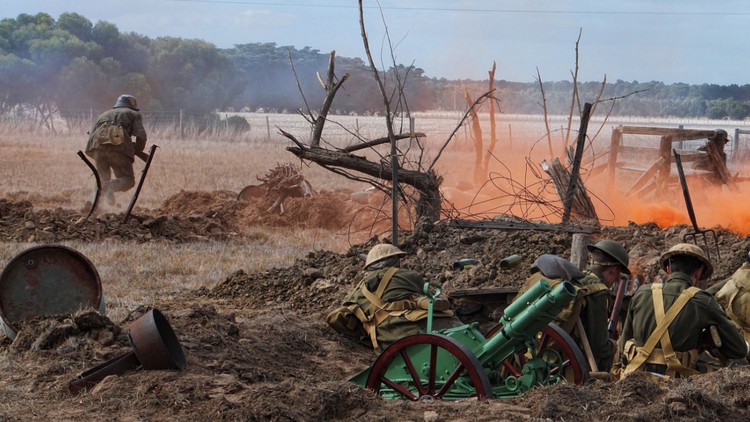
What you will learn
Causes of the First World War of 1914-1918
Nationalism, Patriotism and Public Opinion in the States before World War 1
German nationalism and how it caused the War of 1914
Britain’s contributions to the outbreak of World War 1
How Austria-Hungary contributed to the outbreak of the War
The contributions of French revanchism to the outbreak of the War
Russian mobilisation and the World War
The role of Serbia in causing World War 1
The absence of a pro-peace International Organisation in 1914
Description
N.B. INTERESTED STUDENTS, PLEASE TAKE NOTE:
-
This course is still in beta mode
-
Captions will be properly edited in English
-
More lectures are to be added for Part A (Currently in the post-production phase)
-
Some lectures with poor audio quality will also be replaced
-
After all the modules and videos of this course have been uploaded, you are going to learn about the major causes of the First World War of 1914 to 1918.
-
Here is what you will learn:
A. WHAT WAS WORLD WAR 1 OR WW1 DEFINITION?
This video will be replaced by a better video
B. A BRIEF HISTORICAL BACKGROUND OF SOME EUROPEAN STATES BEFORE 1914
The German lecture will be replaced by another good-quality audio-video. The other lectures are ready.
-
Germany and the German Empire
-
Britain and the British Empire
-
France and the French Empire
-
Austria-Hungary or the Austro-Hungarian Empire, The Dual Monarchy
-
Russia and the Russian Empire
-
The Kingdom of Italy
-
Serbia
-
Turkey, The Ottoman Empire
C. THE MAJOR CAUSES OF WW1 (LECTURES TO BE ADDED)
N.B MOST LECTURES FOR THIS SECTION HAVE NOT BEEN UPLOADED YET. STILL IN THE POST-PRODUCTION PHASE
1 – The Alliance System
You will learn about the bilateral and multilateral alliances in Europe before 1914 and how they caused the war in 1914. Bilateral alliances included the Dual Alliance, the Entente Cordiale or Anglo-France Alliance, and the Anglo-Russian Entente. The multilateral alliances included the Tripple Entente and the Triple Alliance.
2 – Economic competition amongst the Great Powers
In this section, you will learn about the rise of Germany and the economic rivalries or economic competition amongst the great powers before 1914.
3 – Militarism: The Arms Race
You will learn about how the increase of armaments before 1914 contributed to the worsening of relations in Europe.
4 – Imperialism – Competition for overseas territory after 1905: The Tangier Crisis / The First Moroccan Crisis (1905-1906) and The Algeciras Conference (1906)
You will understand how the 1st Moroccan Crisis divided the great powers
5 – Militarism: The Naval Race
In this part, you will understand the Anglo-German naval race and how it caused the war
6 – Balkan Nationalism: Bosnian Crisis: Austrian annexation of Bosnia and Herzegovina (1908)
Here you will learn about how the Bosnian Crisis was a direct cause of the First World War
7 – Imperialism – Competition for overseas territory after 1905: The Second Moroccan Crisis/ Agadir Crisis (1911)
In this part, you will understand how the Anglo-France Alliance or Entente Cordiale was strengthened against Germany.
8 – Balkan Nationalism: The Balkan Wars (1912-1913)
You will learn about the fall of the Ottoman Empire and the rise of the Balkan States like Serbia. This had direct and indirect effects.
9 – Balkan Nationalism – The Sarajevo Incident
This was the assassination of Archduke Franz Ferdinand of Austria in June 1914. This was a turning point in European History.
10 – The July Crisis
In July 1914, after the Sarajevo incident, the great powers were not able to ensure peace in Europe. You will learn about the events of July 1914 and how they caused the war in 1914.
11 – Militarism: The Existence of War Plans
The European states had war plans that were created in preparation for war against enemy states. In this section, you will learn how plans like the Schlieffen Plan (Germany) and Plan 17 (France’s Plan XVII) led to the outbreak of War in 1914.
12 – Militarism: Military Leaders and Their Influence
Here you will learn of how some European military leaders are to blame for the 1914 war.
13 – Poor Diplomacy – There was no organization to promote peace and discourage wars
You will learn about how the absence of an International Organization like the United Nations is to blame for the war in 1914
Bonus
There are practice questions after most of the lectures. These will allow you to master this topic by critically analyzing History.
D. HOW NATIONALISM, PATRIOTISM, AND PUBLIC OPINION CAUSED WW1
N.B Videos for this section have been uploaded
Here you will learn about how Nationalism, Patriotism, and Public Opinion in the following states caused the War:
-
Germany
-
Britain
-
Austria-Hungary
-
France
-
Russia
-
Serbia
E. CONCLUSION
Video not yet uploaded
Content
Introduction
A Brief Historical Background of Some Notable European States before 1914
Part 1 – The Major Causes of World War 1
Part 2 – Nationalism, Patriotism, Public Opinion & the outbreak of WW1